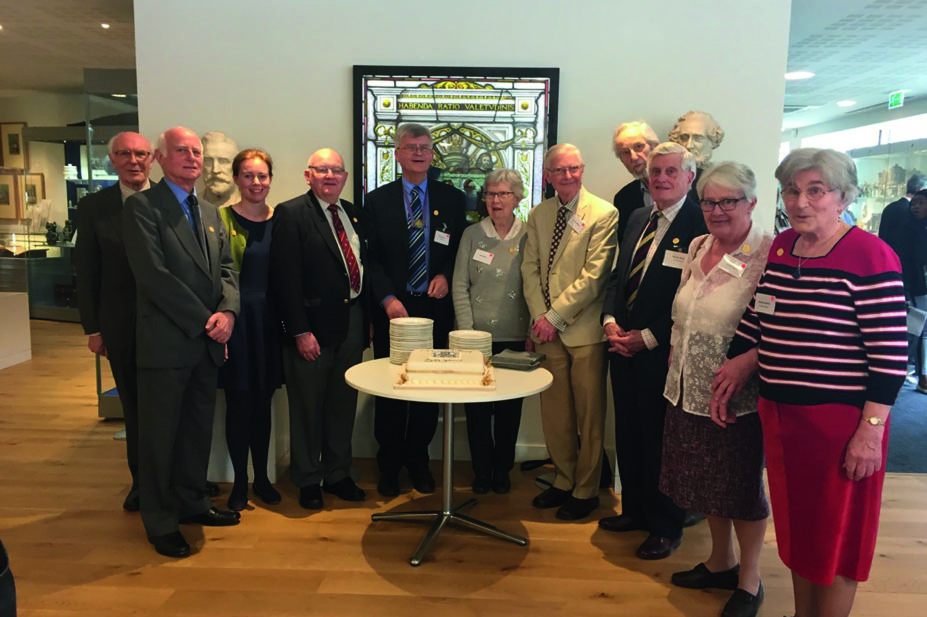
Courtesy of Briony Hudson
The British Society for the History of Pharmacy (BSHP) celebrates its 50th anniversary this year, and its conference (1–2 April 2017) was a chance to take stock. Many of the talks and lectures focused on significant milestones: the Society of Apothecaries at 400, the UCL School of Pharmacy at 175, BSHP and its journal the Pharmaceutical Historian at 50.
For someone like me, a past curator of the RPS Museum and now a professional historian, these are topics that are interesting in their own right and on their own merits. But do the stories told have relevance today? Is it all a nostalgic sideshow? Should pharmacy be interested in its history?
This is a big question and one that has been debated for decades. However, there were some encouraging signs for those of us who believe that history is a key part of pharmacy’s identity.
The BHSP conference:
- Had the most delegates for many years with a mix of retired pharmacists, undergraduate pharmacy students, heritage professionals, and academic historians
- Hosted fourth-year pharmacy students from Liverpool John Moores University, with posters from their final-year history projects
- Welcomed a number of overseas delegates, which, although not a new phenomenon, is an ongoing sign that British pharmacy history is of interest beyond Britain
- Included an announcement at the annual general meeting that the Pharmaceutical
Historian is being re-launched as international and online, with a new international editorial board - Also heard that BSHP are about to launch a new website to stand alongside its presence on Facebook and Twitter.
Set up under the auspices of the Society, BSHP was informed 50 years ago by the then Pharmaceutical Society of Great Britain Council that it was not keen to fund activities that would attract non-members and historians. Today, our evening lectures, three-day pharmacy history course run in partnership with the Society of Apothecaries’ History Faculty, and half-day symposium hosted at the Wellcome Trust, attract retired pharmacists but less than a handful of practising members and no pharmacy students despite generous subsidised fees from BSHP for the course. At all BSHP events, pharmacists are outnumbered by their retired colleagues, a fascinating mix of heritage professionals, other retired medical practitioners, and postgraduate humanities students. This is not a bad thing because it leads to vibrant discussions and valuable networking.
But should BSHP be disappointed that pharmacists themselves rarely find time to attend? And lack of time is often given as the primary reason, a factor we should not ignore. The BSHP’s challenge, set at the conference by both outgoing and incoming presidents, in formal discussion sessions and informally, is to seek to attract more practising pharmacists and pharmacy students to become actively interested in their own profession’s past.
It seems that pharmacy history may have shaken off its outdated image as the leisure pursuit of the retired amateur among non-pharmacists, but among the Royal Pharmaceutical Society (RPS) membership I am concerned that it is still perceived as solely the preserve of the retired. There is absolutely nothing wrong with pharmacists finding the time to investigate historical topics in retirement. In fact the BSHP positively encourages this — but if they are the only pharmacists involved in pharmacy history, surely the profession is missing many opportunities. The skills developed by grappling with historical topics are transferable and valuable; the sense of belonging to a profession with strong roots provides today’s practitioners with a sense of solidity; the ability to explore the background to current debates and developments provides context; the opportunity to evaluate historical evidence and communicate it effectively engenders relevant and timely skills. This is not a new discussion: I most recently re-visited it in written form in a 2011 article with Stuart Anderson (http://pharmacyeducation.fip.org/pharmacyeducation/article/view/308) but it’s a permanent agenda item at BSHP committee meetings.
This conference threw up some ideas for BSHP to explore:
- Continuation of our work with the RPS museum and library to offer joined-up support to pharmacists who want to explore the profession’s history
- Further liaison with BPSA to fully understand the historical topics and approaches that appeal to students
- Possible meeting with the Pharmacy Schools Council to discuss ways that pharmacy history could enhance the undergraduate timetable
- A review of our Burnby Memorial Bursary, annually awarded to a student and worth £500. Of the six recipients so far, only two have been pharmacy students
- Working to achieve more consistent publicity for our events and initiatives through RPS communication channels
- Continuation of our evening lecture meetings at the UCL School of Pharmacy, a move that has seen more students and staff attend, although many more would be welcome.
But we are also keen to hear from anyone who has thoughts on what pharmacy history means to them or how they would like to engage with historical topics. I firmly believe that pharmacy’s history is worth much more than a passing glance by today’s pharmacist and that the BSHP is well placed to champion it for many years to come.
Briony Hudson is a freelance museum curator and pharmacy historian, and BSHP past president
BSHP links:
Facebook: ‘British Society for the History of Pharmacy’
Twitter: @PharmHist


